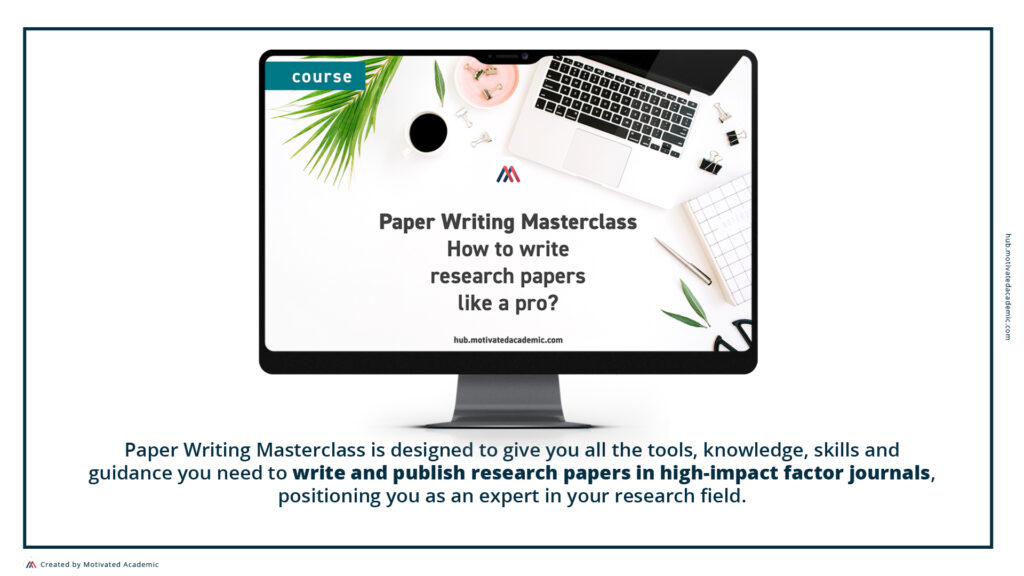Wonder how to write a research paper and build and expert track record? We’ve shared our academic and editorial experience to help you grow as researcher!
We know that writing academic papers can be a daunting and stressful task, especially when you’re early in your research programme. When you juggle research and teaching and potentially any other activities in your research programme, it’s tempting to leave little or even no time to writing up your research.

But at Motivated Academic, we believe that writing high-quality academic research papers doesn’t need to be a task that you detest. Academic writing is a crucial skill that each researcher and academic need to master to succeed in their careers, regardless of whether you’re in social sciences, engineering, behavioral sciences, policy design, arts or any other research area.
This is because publishing academic papers help you:
- establish yourself as an expert in your research area,
- share the findings from your research with relevant audiences, and
- build a track record of research that’s necessary for academic progression, grant applications and job applications.
We know that scientific writing isn’t easy at first. We were there ourselves, and kept wondering how to write a research paper. But are now authors of dozens of academic articles in prestigious journals. That’s why we know that with just a little bit of practice, patience and support, you can develop this skill and become a confident writer of outstanding papers.
Why do you need to learn to write and publish academic papers? Well, publishing in academic journals is still the key route to achieving impact and sharing your science. That’s why it’s crucial to understand how academic publishing works, what is a peer-review process, who are the key audiences that you get to work with and, ultimately, how to write an academic research paper.
We want you to enjoy the writing process, avoid anxiety and feeling overwhelmed with writing, especially when you feel pressure to get your paper out as soon as possible. Over the past year, we’ve produced a lot of content around writing research papers that were highly popular among members of our community. To save you time trying to find these articles on our blog, we collated all our content that will help you develop an academic publication. We trust this is useful!
Research paper 101: how to write a research paper like a prof?
Writing scientific articles is an art that each researcher and academic needs to master to share their research with the academic community. It’s important to understand the importance and purpose of academic publishing early in the academic career. That’s why in this article, I decided to share my reflections on the key questions that early-career researchers often ask me. I share the “why, what and how” of writing papers!
How to write an outstanding abstract for your research paper?
Did you know that an abstract is the most important part of your research paper? You can see it as a sales pitch to fellow researchers in your field. Make sure you only present the most critical information in a way that is easy to read and appealing even to readers out of your research field. When written with their questions in mind, you can increase engagement with and impact of your work. In this article, I share the good practice that will help you and your co-authors write an outstanding abstract for your paper.
How to write an abstract?
The abstract (and title) will likely be the most often read sections of your research paper. This is mostly because it isn’t hidden behind paywalls and is easily accessible. Therefore, it’s important to make it as exciting as possible to encourage other researchers to read your work and use it in their research. In this article, I share a detailed explanation of each part of the abstract you need to include.
How to write a literature review in 6 easy steps?
Do you hate writing a literature review? I can relate to this! We all find writing a literature review a daunting challenge. However, once you realise that by performing your own literature review, you’ll find an astonishing amount of information that will elevate your research to the next level. You’ll become hungry for reading and reviewing the literature. Never let anyone else do this for you. Otherwise, you’ll miss out on an important part of doing research! In this article, I share the key steps I take to write literature reviews in my research.
12 PhD tools to supercharge your literature review
A literature review is an inherent part of each research project. It does not need to be a tedious exercise that you “have to do” in your project. This part of your research project will help you to scope and drive your project forward. In this article, I present the research tools that I use in my work. I trust you found the list useful and will use some of them to improve your productivity!
How to motivate yourself when writing a research article?
Academic writing is a crucial skill that we need to develop to become successful researchers and academics. But getting motivated to write is sometimes difficult, especially when we leave it to the last minute (unless you’re fuelled by the approaching deadline!).
You can become more motivated by:
- properly planning your manuscripts to have a clear idea of the direction and content for your writing;
- embedding your writing process in your research to avoid frustrations and misplacing relevant information; and
- scheduling regular writing sessions to develop a good writing habit.
All of these are activities that can help you to avoid being overwhelmed with writing and cherish the entire process.
How to avoid plagiarism in your research?
Research is the act of creating new knowledge and improving the understanding of the world that surrounds us. To advance knowledge, we usually build on what we already know. It’s, therefore, crucial to acknowledge those who created the knowledge we use in our work.
Plagiarism may seem scary. But if you follow the simple steps of:
- not copying someone else’s work,
- properly paraphrasing and quoting their work,
- and efficiently managing your references
you won’t have anything to worry about.
Whether you’re an early career researcher or an experienced academic, it’s always good to check your work for plagiarism. Even though you don’t have the slightest intention to copy someone else’s work, it’ll give you peace of mind before submission.
7 common mistakes to avoid in a research article: editor’s and reviewer’s perspective.
Writing research articles is the main way to share your research. And it may be challenging, especially if you haven’t published before and don’t have sufficient support. In this article, I shared my take on the key issues and mistakes I noted in research papers as a peer reviewer and editor.
Publish or perish: did we get lost in the pursuit of academic success?
Because of the “publish or perish” culture, we may have lost sight of the essence of science – to advance our understanding of the phenomena governing the world so that we can make it a better place to live. However, to achieve academic success you should not produce as many publications as possible. Remember that quality always goes before quantity. To achieve success in an academic career, I want you to take a more holistic view of being a researcher or an academic. It means you will engage with key stakeholders and “publish quality work and succeed!”
By the way, we launched our Paper Writing Masterclass! We’re really excited about it! You can access it on our Hub! (click here!)




